Description
This thermocouple-to-CAN module generates temperature data from 4 thermocouple sensors and outputs it via CAN bus (standalone) or USB The module supports all thermocouple types (B, E, J, K, N, R, S, T) and can easily be connected in series.
The module can be integrated into any CAN bus system - e.g. to provide temperature data for your control units or existing CAN hardware. For example, you can use the module as an add-on for CANedge - ideal for engine test benches, EGT analyses or temperature telematics.
Features
PLUG
Standalone - no PC required. Integrate it into any CAN bus to add temperature data. DBC includedCOMPACT
Only 7 x 2 x 5 cm. 80G. Aluminium housing. 3 LEDs. 5-26 V DC via DB9. USB for configuration/FW/streamTHERMOELEMENTS
Output data from 4 thermocouples at 5 Hz. High signal resolution of 0.01 °CPRECISE
High accuracy with cold junction compensation and mains frequency filtering. Error detectionUSE ANY TYPE
Configure each thermocouple channel type independently (B, E, J, K, N, R, S, T).CONFIGURABLE
Configure CAN IDs, bit rate, message frequencies and more via the JSON configuration and GUI
Easily add temperature data to any CAN bus system
Add temperature sensor data via 4 thermocouples to your CAN bus - e.g. for use by ECUs or CAN hardware.
- Compatible with any high-speed CAN bus (2.0A, 2.0B)
- Fully configure CAN IDs, bit rate and message frequency
- Concatenate multiple modules for 8, 12, 16, ... Channels
- Power supply with 5-26 V DC via standard DB9 adapter cable
- Optionally, you can record the data via any CAN interface/logger/... .
- Example: Use as an add-on for the CANedge (power supply via 2nd port)
- DBC file included for simple decoding into a human-readable form
- White label e.g. for integration into your production
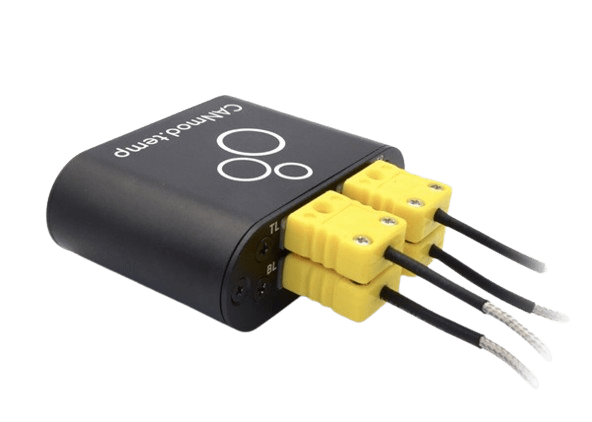
Example: Logging/streaming sensor data
The CANmod.temp is often used as an "add-on" for the CANedge. With this setup you can, for example, record vehicle data via channel 1 and temperature data via channel 2. The data can be easily DBC-decoded, for example via the asammdf GUI, Python or MATLAB.
You can also stream the sensor data with SavvyCAN in real time via USB to display raw/decoded data (e.g. via graphs) - ideal for validating your setup before deployment or for lab testing.

With the CANmod.temp module, you can connect up to 4 thermocouple sensors (configurable type) and output the temperature data to any CAN bus via configurable CAN frames. You can install the CANmod.temp "standalone" in any CAN system (cars, lorries, ships, ...) to feed configurable CAN frames with temperature data into the existing CAN traffic. For example, the CANmod.temp module can be used as a plug & play add-on module for the CANedge (power supply via the 2nd port) - so you can combine CAN/LIN data with time-synchronised temperature data.
If you use CANmod.temp to output data directly in your CAN bus, the data can be used by other control units in the network, for example. The CANmod.temp can be configured via the USB port using our online/offline configuration editor tool (or a simple JSON text editor). You can easily combine and daisy-chain multiple CANmod modules to add different sensor types and/or more channels
The device allows you to output temperature signals in one CAN frame with a resolution of 1 °C or in two CAN frames with a resolution of 0.01 °C
Technical Data
| Model specification | 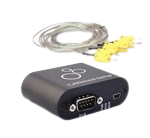 CANmod.temp |
|---|---|
| Functionality | The device supports 4 x thermocouples for the output of temperature sensor data via CAN bus and/or USB |
| Included | CANmod.temp module, USB dust cover (thermocouple sensors and mini-USB adapter not included) |
| Firmware | Supports free firmware updates via USB to add functions |
| Configuration | Configuration files based on the popular open source -JSON schema concept (similar to CANedge) |
| Software | Free open source editor tool for easy device configuration (offline/online version available) |
| Safety and security | CE, FCC, IC and RoHS certified (certificates can be found in the documents) |
| Warranty | 1 year warranty |
| Support | Free, fast and high-quality support |
| Country of origin | Denmark |
| Channels | Supports up to 4 thermocouple sensors/channels (plus ambient temperature via cold junction) |
| Module | Professional precision thermocouple converter MAX31856MUD+ |
| Temperature range | Supports a range from -210 °C to +1800 °C (depending on thermocouple type) |
| Formatting | Degrees Celsius are conveniently output by the module via automated edge linearisation |
| Accuracy | Accuracy of thermocouple voltage measurement in laboratory quality with cold junction compensation |
| Resolution | 1 degree Celsius resolution (in 1 CAN frame) and/or 0.01 degree Celsius resolution (in 2 CAN frames) |
| Protection | Thermocouple inputs are protected against overvoltage conditions up to ±45 V |
| Types | Supports thermocouple types B, E, J, K, N, R, S, T (via configuration) |
| Filtering | Mains frequency filtering of 50 Hz and 60 Hz (via configuration) |
| Fault detection | Thermocouple error detection (open thermocouples, over- and undertemperature) is communicated via CAN |
| Cold junction | ±0.7 °C (max. -20 °C to +85 °C) Cold junction accuracy |
| CAN signals | The module communicates temperatures and error status (a complete list can be found in the documents or in the DBC file). Thermocouple temperatures: The degree Celsius temperature of each thermocouple probe [5 Hz] Ambient temperature: The ambient temperature measured via the internal cold junction [5 Hz] Error: Status of each thermocouple sensor [5 Hz] |
| Channels | 1 x CAN channel |
| Modes | The device can either send the data to the CAN bus or provide it on request |
| Standard | ISO 11898: Compliant with CAN (baud rates between 5K and 1 Mbit/s) |
| Identifiers | Compliant with CAN specifications 2.0A (11-bit ID) and 2.0B (29-bit ID) |
| Termination | Termination can be changed using the switch under the DB9 connection |
| Retransmission | Retransmission of frames that have lost arbitration or have been disturbed by errors |
| Transceiver protection | Protection: +/- 25 kV HBM ESD, +/-12 kV IEC ESD, +/-14 V bus error, short circuit Common mode input voltage: +/-12 V TXD-dominant timeout (prevents network blocking in the event of an error) |
| Bit rate | Choose between standard bit rates (5K to 1M) or use customised bit timing |
| Activate Deactivate | Activate/deactivate CAN message individually |
| Identifier customisation | Configure the CAN ID individually (11-bit or 29-bit) |
| Push/poll mode | Configure individual "trigger" modes for the CAN messages (push or poll). |
| Frequency | Individually configure the pre-scaling of the CAN message frequencies to lower rates |
| Thermocouple type | Specify the thermocouple type for each channel (e.g. type K, type J, ...) |
| Line noise filtering | Select the suppression of 50 Hz (EU) and its harmonics or 60 Hz (USA) and its harmonics |
| Input supply | +5V to +26V DC via the DB9 connector (standalone/add-on mode) or Alternatively, power supply via USB (for updating firmware/configuration or streaming data in real time) |
| Power consumption | Extremely low (<1 W) - no risk of battery discharge |
| Protection | Reverse polarity protection of the CAN bus supply Protection against transient voltage events on supply lines |
| Housing and weight | Compact aluminium housing: 52.5 x 70.0 x 24.5 mm (L x W x H), 80 grams |
| Connection (front) | 1 x standard D-Sub 9 connector (DB9). |
| Connection (rear) | 4 x miniature thermocouple sockets |
| Pin assignment | Information on the pin assignments of the DB9 connector can be found in the product manual |
| USB | Standard mini USB port for configuration/firmware updates and streaming (USB cable not included) |
| LEDs | Module status via 3 external LEDs: Power, CAN bus, memory |
| Module temperature | Operating temperature (CANmod.temp module): -25 °C to +70 °C |
| IP rating | IP protection class 40 |
| Mounting | The module can be mounted using robust double-sided adhesive tape, cable ties or a mounting bracket, for example |
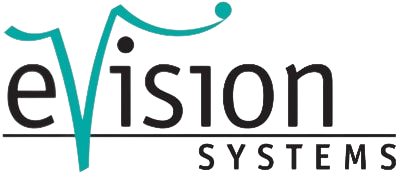
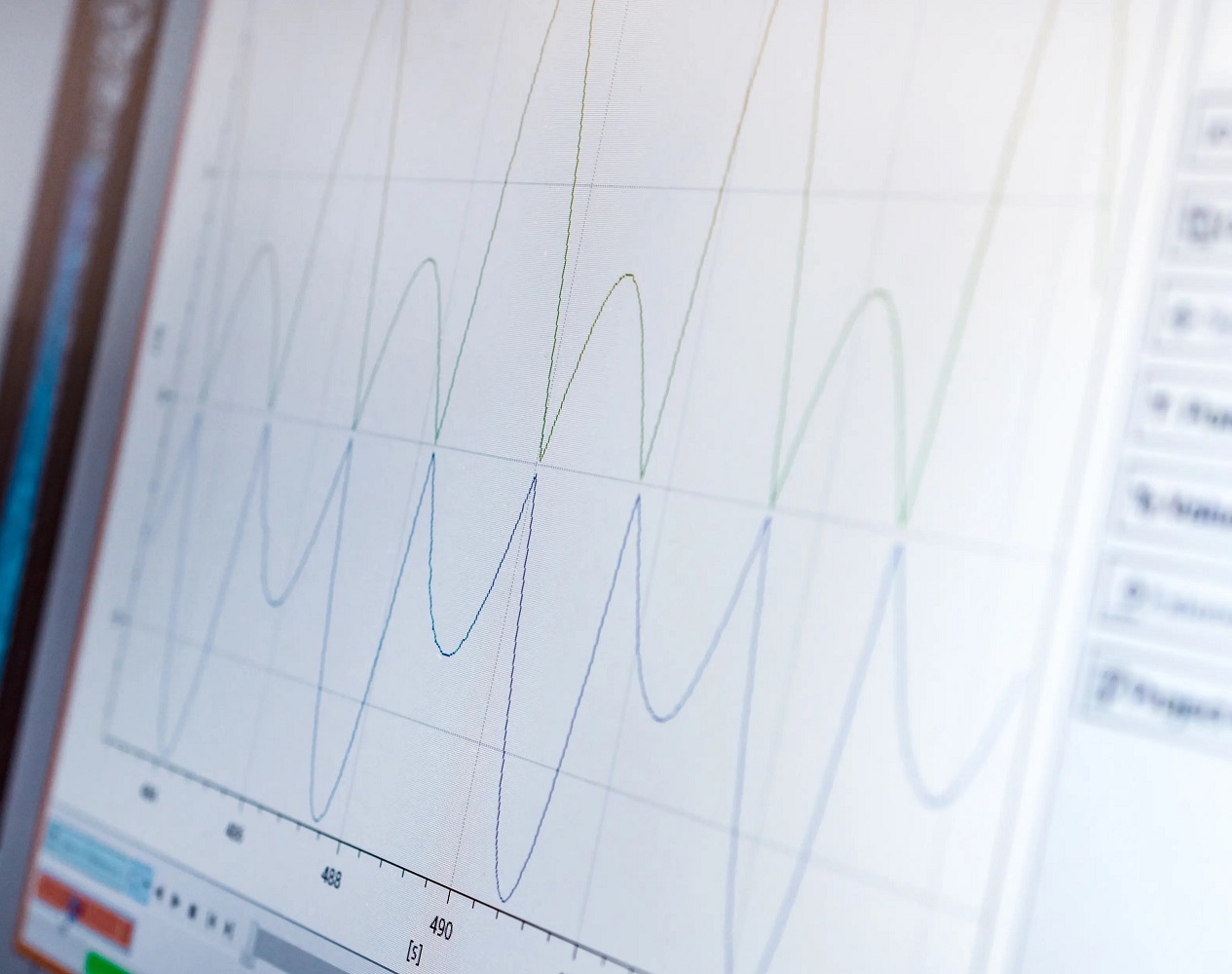






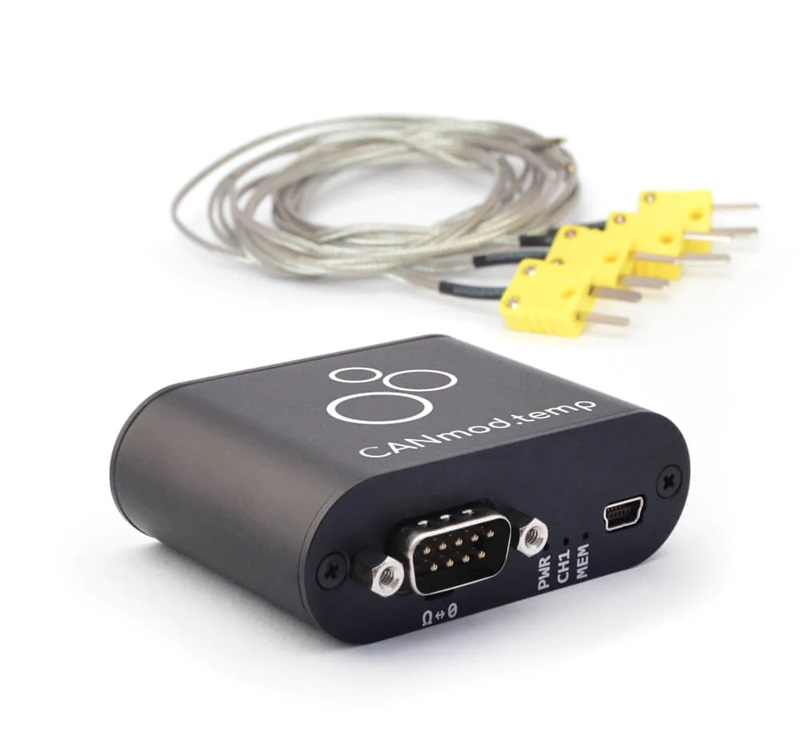

.jpg)
.jpg)
.jpg)
.jpg)